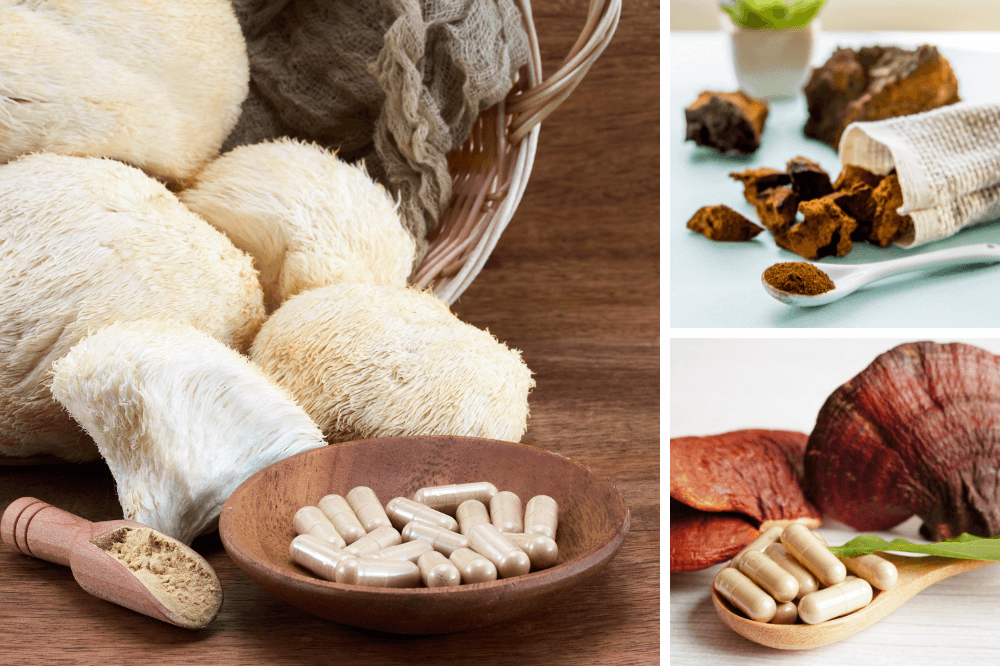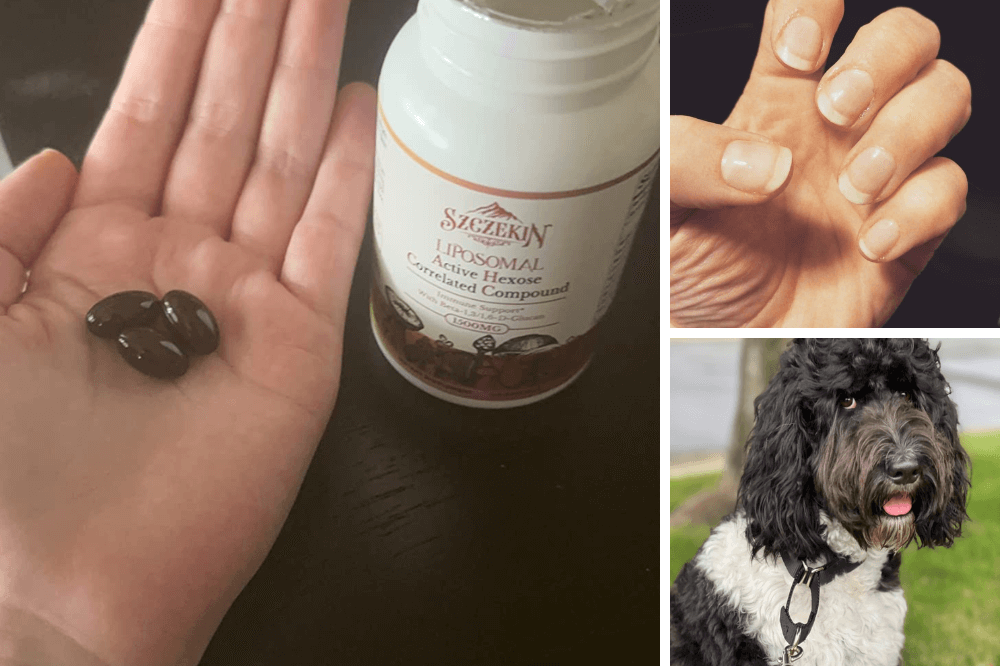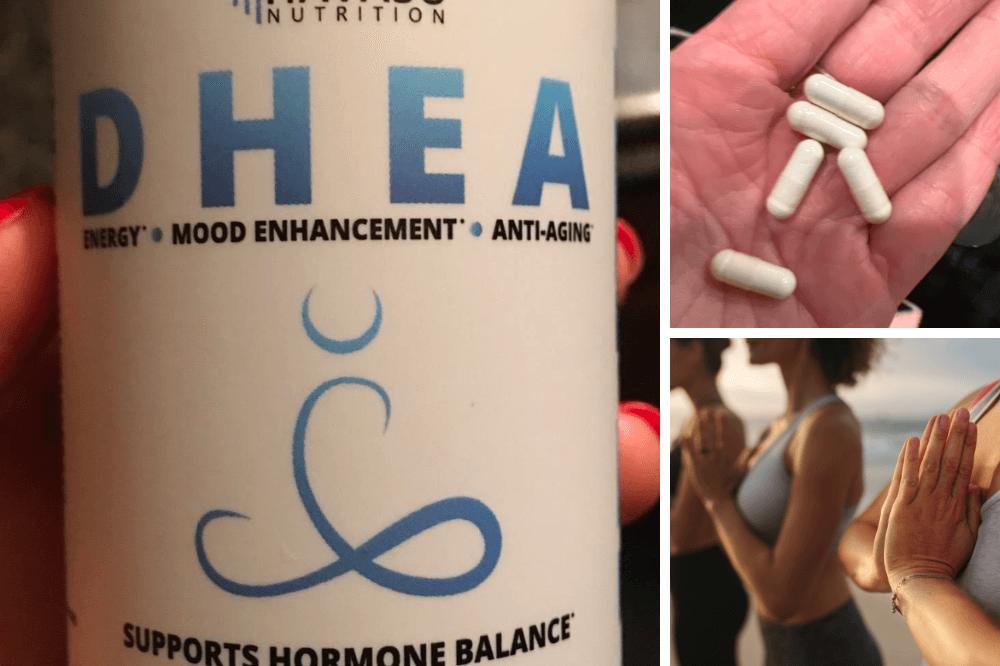Introduction
Mushroom supplements are becoming a popular way to enhance overall wellness naturally. Traditionally used in Chinese medicine, medicinal mushrooms like lion's mane, reishi, and shiitake are valued for their potential health benefits. Modern research now suggests that these fungi might support immunity, brain health, and even reduce inflammation. Let's dive into the fascinating benefits of mushroom supplements and what scientific evidence says about their effectiveness.
What Are Mushroom Supplements?
Mushroom supplements are concentrated extracts or powders derived from various medicinal mushrooms. Available in capsules, powders, and teas, these supplements make it easy to integrate the benefits of mushrooms into everyday routines. Each mushroom type offers unique bioactive compounds that may positively impact health. It is crucial to select a quality mushroom supplement, paying attention to beta-glucan content and avoiding products with fillers.
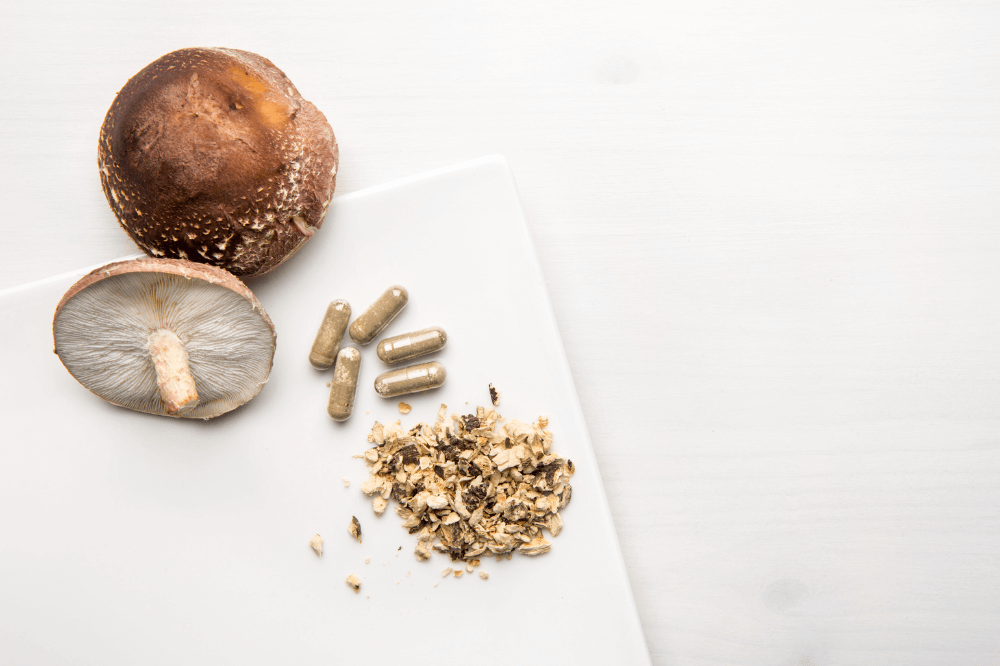
Health Benefits of Medicinal Mushrooms
1. Immune Support
Medicinal mushrooms are packed with beta-glucans and polysaccharides that may enhance immune function:
- Reishi: Known as the "mushroom of immortality," reishi may stimulate immune cells like natural killer cells, boosting the body's defense system.
- Turkey Tail: Rich in polysaccharides, turkey tail mushrooms are known to activate immune cells, such as T-cells. This may support immune health and is even used in cancer support therapies.
2. Cognitive Health and Nerve Function
Several mushrooms have been shown to enhance cognitive function and support nerve health:
- Lion's Mane Mushroom: Known for its potential benefits for brain health, lion's mane mushroom contains nerve growth factor (NGF) compounds that can help with nerve repair and regeneration, which may reduce symptoms associated with cognitive decline and improve memory.
- Reishi and Shiitake: May have neuroprotective effects and potentially reduce cognitive decline when taken regularly, though more research is needed to confirm these benefits.
3. Inflammation Reduction
Many mushrooms contain bioactive compounds with medicinal properties that contribute to inflammation reduction, making them beneficial for people with chronic inflammatory conditions:
- Chaga: Rich in antioxidants, chaga mushrooms may help reduce oxidative stress, a common cause of inflammation.
- Reishi: Some studies suggest that reishi's triterpenes can reduce inflammation in the body and may act similarly to nonsteroidal anti-inflammatory drugs (NSAIDs), without as many side effects.
4. Heart Health and Blood Sugar Regulation
Some mushrooms have properties that support heart health and aid in regulating blood sugar levels:
- Maitake and Shiitake: Both mushrooms have been shown to reduce blood sugar levels and improve insulin sensitivity.
- Reishi: May support heart health by lowering blood pressure and cholesterol levels, reducing risk factors for heart disease.
5. Potential Anti-Cancer Effects
Certain mushrooms are being studied for their potential to slow cancer growth and support cancer treatments:
- Turkey Tail: Known for its polysaccharide K (PSK) content, turkey tail is used in cancer treatment in some countries to improve immune function during chemotherapy.
- Reishi and Maitake: May contain compounds that inhibit tumor growth by enhancing the immune response.

6. Antioxidant Properties of Medicinal Mushrooms
Medicinal mushrooms are renowned for their potent antioxidant properties, which play a crucial role in protecting the body against free radicals and oxidative stress. Free radicals are unstable molecules that can damage cells, leading to various diseases, including cancer, cardiovascular disease, and neurodegenerative disorders. Antioxidants neutralize these harmful molecules, preventing cellular damage and promoting overall health.
Reishi mushrooms, often called the "mushroom of immortality," are rich in antioxidants such as polysaccharides, polyphenols, and triterpenoids. These compounds not only help reduce oxidative stress but also exhibit anti-inflammatory and immunomodulatory effects, potentially lowering the risk of chronic diseases.
Shiitake mushrooms are another excellent source of antioxidants. They contain compounds that combat oxidative stress and inflammation, thereby supporting the immune system and reducing the risk of chronic illnesses. Additionally, shiitake mushrooms are known for their cholesterol-lowering properties, further contributing to cardiovascular health.
Lion's mane mushrooms also boast significant antioxidant content. These antioxidants help protect against oxidative stress and inflammation, which are linked to various chronic conditions. By incorporating lion's mane into your diet, you can support your immune system and overall well-being.
The antioxidant properties of medicinal mushrooms make them a valuable addition to a healthy lifestyle. They offer protection against oxidative damage and support long-term health.
Popular Medicinal Mushrooms and Their Benefits
Lion's Mane Mushroom
Often touted for its mental health benefits, lion's mane has shown promise in promoting nerve growth factor (NGF) production, which supports brain health and cognitive function. Regular consumption of lion's mane could potentially benefit those with mild cognitive impairment or memory issues. Additionally, lion's mane mushrooms may aid in reducing symptoms of anxiety and depression, and possess anti-inflammatory properties, but it is important to consult a healthcare professional before use.
Reishi Mushroom
Reishi's adaptogenic properties help the body manage stress and may improve immune function. Commonly used in traditional Chinese medicine, it's believed to promote longevity and vitality.
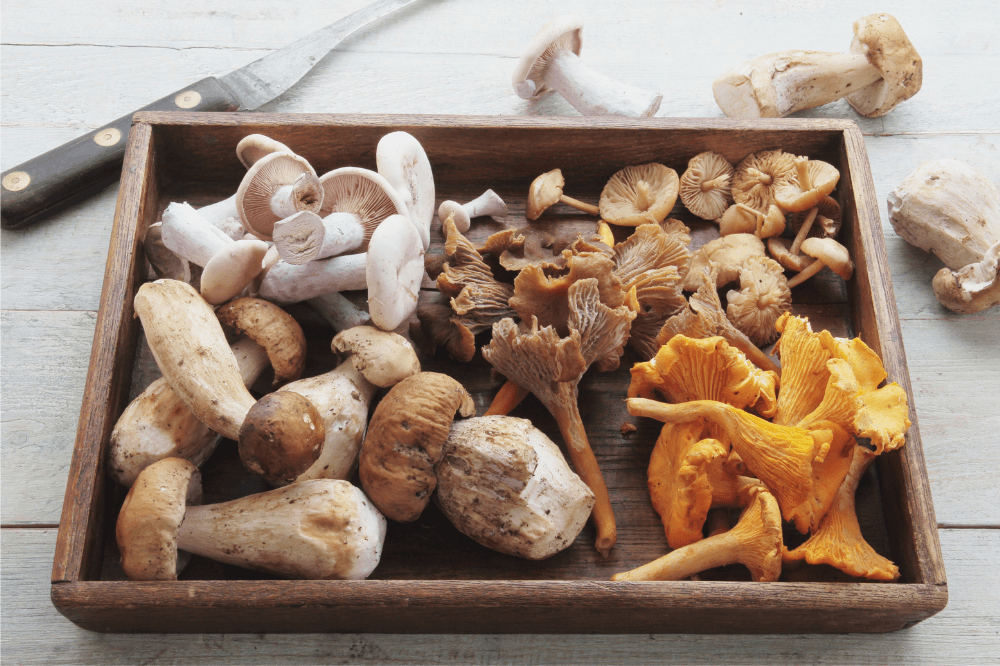
Shiitake Mushroom
Known for their cholesterol-lowering effects, shiitake mushrooms may also boost immunity. Rich in vitamin D and essential minerals, they are a great option for supporting bone and skin health.
Turkey Tail Mushroom
Turkey tail's high levels of polysaccharides make it valuable for immune support. Some studies suggest it may even improve survival rates for certain cancer patients, as it helps the immune system fight cancer cells more effectively.
Chaga Mushroom
Often used for its antioxidant properties, chaga is known to reduce oxidative stress and support overall immune health. It may also have anti-inflammatory effects, which could be beneficial for people with chronic inflammation or arthritis.
How to Use Mushroom Supplements
Choosing a Quality Supplement
To gain the full benefits of a mushroom supplement, it is crucial to select a quality one:
- Source: Choose organic or wild-harvested mushrooms when possible.
- Purity: Look for products without fillers or artificial additives.
- Form: Mushroom supplements are available in capsule, powder, and extract forms. Powders may be ideal for adding to smoothies, while capsules are convenient for consistent dosing.
Recommended Dosage
Each mushroom type may have a different recommended dose, so follow the product instructions or consult with a healthcare provider, especially if you're taking medication or managing health conditions.
Safety and Side Effects
Possible Side Effects
While mushroom supplements are generally safe, some people may experience:
- Allergic reactions, such as skin rash or digestive discomfort
- Potential interactions with medications, particularly those that affect blood clotting (e.g., NSAIDs)
Consult a healthcare provider if you have specific health concerns or are taking medications that could interact with mushroom supplements.
Special Precautions
Reishi and certain other mushrooms can affect blood pressure and clotting, so people with heart conditions or those on anticoagulants should use caution. Similarly, mushrooms that boost immune function, such as turkey tail, might not be suitable for individuals with autoimmune conditions.
Mushroom Supplements vs. Whole Mushrooms
- Supplements: Offer concentrated bioactive compounds that are sometimes hard to obtain through diet alone, especially for health effects like cognitive and immune support.
- Whole Mushrooms: Provide dietary fiber, additional vitamins, and the culinary benefits of cooking with mushrooms. Incorporating whole mushrooms like shiitake or white button mushrooms can still contribute to health, but supplements are a more efficient option for specific benefits.
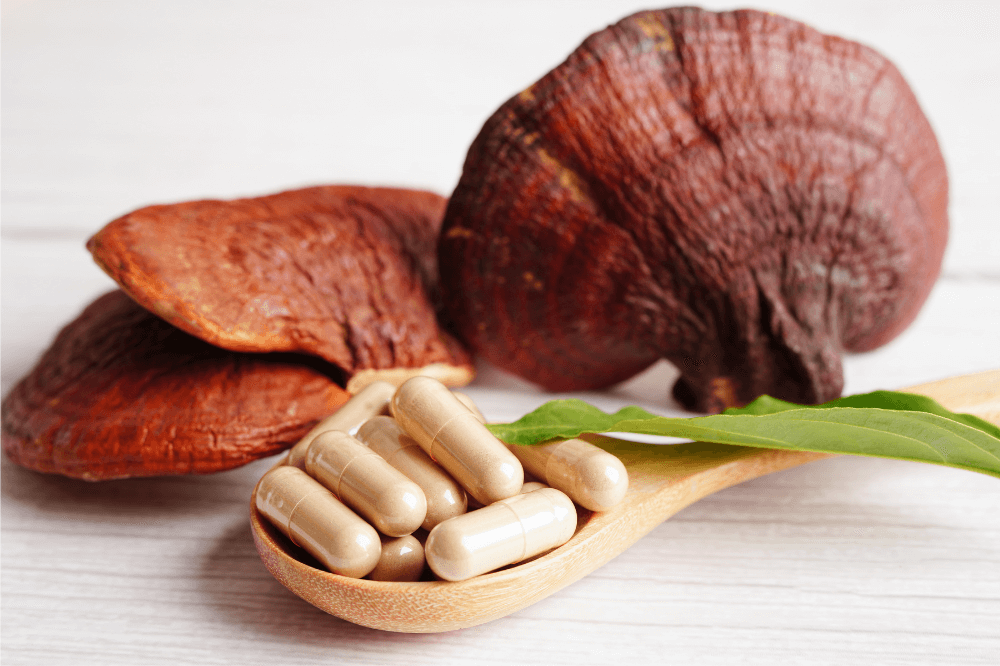
Scientific Evidence and Ongoing Research
Medicinal mushrooms are the subject of increasing scientific research, especially for their potential in immune modulation, inflammation reduction, and cancer support. Animal studies and lab research suggest various benefits, but human studies are still limited for some mushrooms.
Notable Studies:
- Lion's Mane: Early studies show promise for supporting brain cell growth, potentially aiding people with mild cognitive impairment. Additionally, lion's mane mushrooms are being researched for their potential benefits on brain function and memory enhancement, with some studies suggesting they may help protect against neurodegenerative diseases like Alzheimer's.
- Reishi and Turkey Tail: These mushrooms have demonstrated immune-boosting properties, with turkey tail being used in cancer therapies in Asian countries due to its effectiveness in enhancing immune cell function.
As the body of research grows, we may see further confirmation of these benefits in clinical studies.
Medicinal Mushrooms and Cancer Research
The potential anti-cancer properties of medicinal mushrooms have garnered significant attention in recent years. These fungi are being studied for their ability to support cancer treatment and prevention through various mechanisms.
One of the primary ways medicinal mushrooms may help combat cancer is by boosting the immune system. Mushrooms like reishi and shiitake have immunomodulatory effects, enhancing the body's natural defense mechanisms. By stimulating immune cells, these mushrooms can help the body recognize and attack cancer cells more effectively.
Chronic inflammation is a known risk factor for cancer, and medicinal mushrooms are celebrated for their anti-inflammatory effects. Reishi mushrooms, for instance, contain triterpenes that reduce inflammation, potentially lowering the risk of cancer development.
Certain medicinal mushrooms also exhibit anti-tumor properties. Compounds found in reishi, shiitake, and lion's mane mushrooms have been shown to inhibit tumor growth and prevent the spread of cancer cells. These mushrooms may also induce apoptosis, or programmed cell death, in cancer cells, further aiding in cancer treatment.
While more research is needed to fully understand the anti-cancer potential of medicinal mushrooms, existing studies suggest that they could be a valuable addition to cancer prevention and treatment strategies. Incorporating these mushrooms into your diet may help support your immune system, reduce inflammation, and inhibit tumor growth.
Medicinal Mushrooms and Neurological Health
Medicinal mushrooms are gaining recognition for their potential benefits in supporting neurological health and preventing neurodegenerative diseases. These fungi offer several mechanisms that may help protect and enhance brain function.
Lion's mane mushrooms are particularly notable for their ability to boost nerve growth factor (NGF) production. NGF is essential for the growth, maintenance, and survival of nerve cells. By promoting NGF, lion's mane mushrooms may support nerve repair and regeneration, potentially benefiting individuals with cognitive decline or memory issues.
Chronic inflammation is a significant risk factor for neurodegenerative diseases, and medicinal mushrooms like reishi and shiitake have powerful anti-inflammatory effects. By reducing inflammation, these mushrooms may help protect the brain from damage and support long-term cognitive health.
Oxidative stress is another contributor to neurodegenerative diseases. Medicinal mushrooms, rich in antioxidants, can help combat oxidative stress and protect brain cells. Reishi and shiitake mushrooms, for example, contain compounds that neutralize free radicals, reducing the risk of conditions like Alzheimer's and Parkinson's disease.
Incorporating medicinal mushrooms into your diet may offer a natural way to support brain health. Whether through boosting nerve growth factors, reducing inflammation, or combating oxidative stress, these mushrooms hold promise for enhancing cognitive function and protecting against neurodegenerative diseases.
Cardiovascular Health and Medicinal Mushrooms
Medicinal mushrooms are also being explored for their potential benefits in supporting cardiovascular health. These fungi offer several mechanisms that may help prevent and manage cardiovascular disease.
Reishi mushrooms have been found to have blood pressure-lowering effects, making them beneficial for individuals with hypertension. Reishi mushrooms can help reduce blood pressure and support heart health by promoting the relaxation of blood vessels.
Shiitake mushrooms are known for their cholesterol-lowering properties. They contain compounds that can reduce levels of LDL (bad) cholesterol, thereby lowering the risk of atherosclerosis and heart disease. Additionally, shiitake mushrooms have anti-inflammatory effects, which further contribute to cardiovascular health.
Lion's mane mushrooms also offer cardiovascular benefits. Their anti-inflammatory and antioxidant properties help protect blood vessels from damage and reduce the risk of heart disease. By incorporating lion's mane into your diet, you can support overall heart health and reduce the risk of cardiovascular conditions.
Medicinal mushrooms provide a natural way to support cardiovascular health. Whether through lowering blood pressure, reducing cholesterol, or combating inflammation, these mushrooms can be a valuable addition to a heart-healthy lifestyle.
Conclusion
Mushroom supplements offer an array of potential health benefits, from immune support and cognitive enhancement to inflammation reduction. While more research is needed, medicinal mushrooms like lion's mane, reishi, and turkey tail are promising additions to a wellness regimen. Always choose high-quality supplements and consult with a healthcare provider to ensure safe use, especially if you have underlying health conditions. Incorporating mushroom supplements could be a beneficial and natural way to support overall health and well-being.
